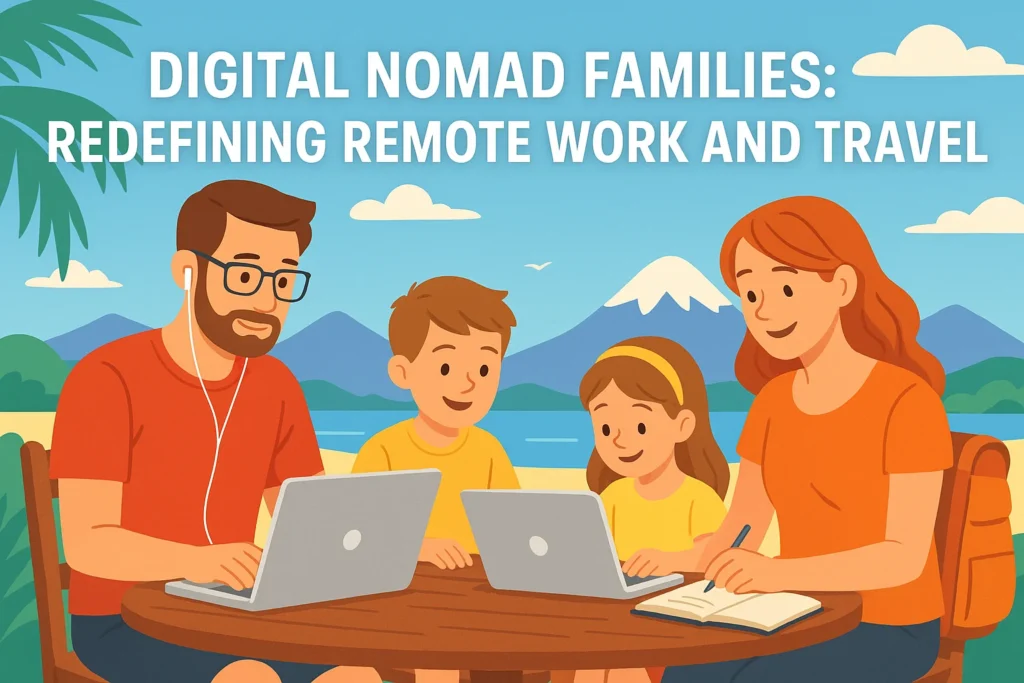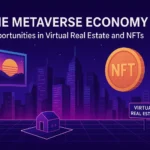The Johnson family wakes up to the sound of waves crashing in Bali. By 9 AM, dad is coding for a Silicon Valley startup from a beachfront café, mom is consulting with European clients via Zoom, and their two kids are building volcanoes for a homeschool science project—before afternoon surf lessons.
This isn’t a vacation. It’s their life.
Meet the digital nomad families—a growing community of parents trading suburban routines for a life where work, school, and travel blend seamlessly. Fueled by remote work and online education, these families are proving you can raise kids while exploring the world.
But how does it actually work? From visas to math lessons on the road, here’s an inside look at this revolutionary lifestyle.
The Rise of the Nomad Family
In 2023, 35% of digital nomads were parents—up from just 12% in 2019. What’s driving the trend?
✅ Remote work is permanent (58% of U.S. workers now hybrid/remote)
✅ Online schooling options exploded post-pandemic
✅ Countries like Portugal & Mexico now offer “nomad visas” for families
“We realized we were paying for a big house just to stare at screens all day. Now our ‘office’ has palm trees.” — The Garcias, nomadic since 2021
A Day in the Life: How It Actually Works
6:30 AM – Sunrise Productivity
While the kids sleep, parents tackle deep work tasks. Time zones become an asset—early risers in Asia finish work before European clients wake up.
9 AM – Worldschooling
Instead of traditional school:
- Math via apps like Khan Academy
- History at Angkor Wat ruins
- Language through local immersion
2 PM – Adventure as Education
Afternoons might include:
- Helping at a Costa Rican animal rescue (biology)
- Budgeting at a Moroccan market (math/economics)
7 PM – Family Time, Global Style
Dinner could be:
- Video calls with grandparents
- Movie nights with nomad friends met in Thailand
5 Surprising Challenges (And How Families Solve Them)
1. The Visa Puzzle
Solution: Countries now compete for nomad families:
- Portugal’s D7 Visa (€7,000/month income)
- Mexico’s Temporary Resident Visa (~$2,500 savings)
- Bali’s New Digital Nomad Visa (5-year stay)
2. Healthcare Hurdles
Solution:
- SafetyWing Insurance ($40/month per child)
- Medical tourism (Thailand’s hospitals rival the West at 1/4 cost)
3. Socialization Myths
Reality: Nomad kids often have more social interaction:
- Co-working space kids’ clubs
- Global friendships through networks like Worldschool Pop-Ups
4. Work/Kid Balance
Pro Tip:
- Split shifts (one parent works mornings, the other afternoons)
- Travel slower (1-3 months per location reduces stress)
5. Education Validation
Solutions That Work:
- Microschools (like Blue House Bali)
- Accredited online programs (Stanford Online High School)
- Portfolio-based assessments (increasingly accepted by colleges)
Countries Rolling Out the Red Carpet
| Country | Perks | Ideal For |
|---|---|---|
| Portugal | EU residency path, great schools | Long-term settlers |
| Mexico | Low costs, strong nomad community | Beginners |
| Thailand | Elite visa, amazing healthcare | Adventure lovers |
| Costa Rica | Pura Vida lifestyle, nature immersion | Eco-conscious families |
Tools That Make It Possible
Work
- Trello (family task management)
- Zoom (client meetings from jungles)
- WiFi Map (finds reliable connections)
School
- Outschool (live online classes)
- Duolingo (language learning)
- Kiwico (hands-on STEM projects)
Life
- Nomad List (finds family-friendly spots)
- TrustedHousesitters (free accommodation worldwide)
Is This Lifestyle Right for Your Family?
The Ideal Nomad Family:
✔ Thrives on change
✔ Values experiences over stuff
✔ Has location-independent income
Think Twice If:
✖ You crave stability/routine
✖ Kids have special education needs
✖ Work requires strict time zones
How to Start (Without Losing Your Sanity)
- Test Drive It – Rent an Airbnb abroad for 1 month
- Join Communities – Facebook groups like Digital Nomad Families
- Simplify – Sell/donate 80% of belongings
- Edu-Plan – Mix online curriculum + local experiences
- Go Slow – Start in easy hubs like Lisbon or Playa del Carmen
“Our kids have more resilience and cultural IQ than most adults. Best decision we ever made—but it’s not a vacation.” — The Chen-Riley Family, 4 countries in 2 years
Could YOUR family thrive as digital nomads? Share your biggest question below! 🌍✈️



